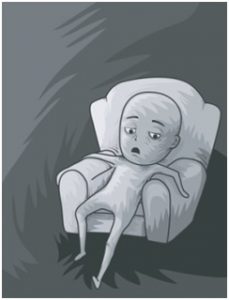Work offers us not just a paycheque at the end of the month but it is a significant source of socialisation, providing us with self-esteem, a sense of inclusion and most importantly a sense of purpose and a reason to get up in the mornings.
Worklessness: An involuntary exclusion from the labour market
Long-term worklessness has been associated with smoking, obesity, increased mortality from cardiovascular disease and suicide.2
Overall work is good for physical and mental health and well being, and lack of employment leads to physical and mental deterioration.” – AK Burton2

Sadly, worklessness does not just negatively affect the individual but studies show that the children of unemployed parents are more likely to be out of work themselves, and more likely to experience depression, substance abuse, and/or delinquent behaviours.3
By increasing our awareness of the potential negative consequences of worklessness, we as PTs can become more proactive with return to work (RTW) and improve the quality of life for our patients and their families.
After an acute work related musculoskeletal injury, it is natural to take some time off work (especially if the job is physically demanding) in order to rest and recuperate. However, how long of a rest is ideal? There is obviously no single answer to that question but one does need to be aware of the undeniable statistics.
The longer a person is off work and on compensation, the likelihood of them ever returning to work decreases with each passing month.
| Time of work | Likelihood of returning to work |
| 1 month | 67% |
| 2 months | 50% |
| 3 months | 33% |
| (Johnson & Fry 2002) | |
“… long term worklessness is one of the greatest risks to health in our society. It is more dangerous than the most dangerous jobs in the construction industry, …and too often we not only fail to protect our patients from long term worklessness, we sometimes actually push them into it, inadvertently” – G. Waddell2
Our primary goal as PTs is to return our patients back to function, which includes ADLs, hobbies and of course work. We must do everything in our power to maximize the likelihood of our patients’ chances of once again returning to an employment that is safe and meaningful to them.
“Too often, health care professionals see work as the problem rather than the goal or part of the solution, and usually that is wrong.” –AK Burton2
References:
1. Daly A. Worklessness: can physiotherapists do more? J Physiother. 2016 Oct;62(4):179-80.
- Waddell, G. and Burton, A. Is work good for your health and well-being?. The Stationery Office, London, UK; 2006
- Reinhardt P. Madsen, M. Parents labour market participation as a predictor of children’s health and wellbeing: a comparative study in five Nordic countries. J Epidemiol Community Health. 2002; 56: 861–867

